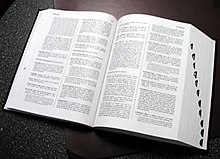
A definition is a statement of the meaning of a term (a word, phrase, or other set of symbols).[1][2] Definitions can be classified into two large categories: intensional definitions (which try to give the sense of a term), and extensional definitions (which try to list the objects that a term describes).[3] Another important category of definitions is the class of ostensive definitions, which convey the meaning of a term by pointing out examples. A term may have many different senses and multiple meanings, and thus require multiple definitions.[4][a]
In mathematics, a definition is used to give a precise meaning to a new term, by describing a condition which unambiguously qualifies what the mathematical term is and is not. Definitions and axioms form the basis on which all of modern mathematics is to be constructed.[5]
- ^ Bickenbach, Jerome E., and Jacqueline M. Davies. Good reasons for better arguments: An introduction to the skills and values of critical thinking. Broadview Press, 1996. p. 49
- ^ "Definition of definition | Dictionary.com". www.dictionary.com. Retrieved 2019-11-28.
- ^ Lyons, John. "Semantics, vol. I." Cambridge: Cambridge (1977). p.158 and on.
- ^ Dooly, Melinda. Semantics and Pragmatics of English: Teaching English as a Foreign Language. Univ. Autònoma de Barcelona, 2006. p.48 and on
- ^ Richard J. Rossi (2011) Theorems, Corollaries, Lemmas, and Methods of Proof. John Wiley & Sons p.4
Cite error: There are <ref group=lower-alpha> tags or {{efn}} templates on this page, but the references will not show without a {{reflist|group=lower-alpha}} template or {{notelist}} template (see the help page).